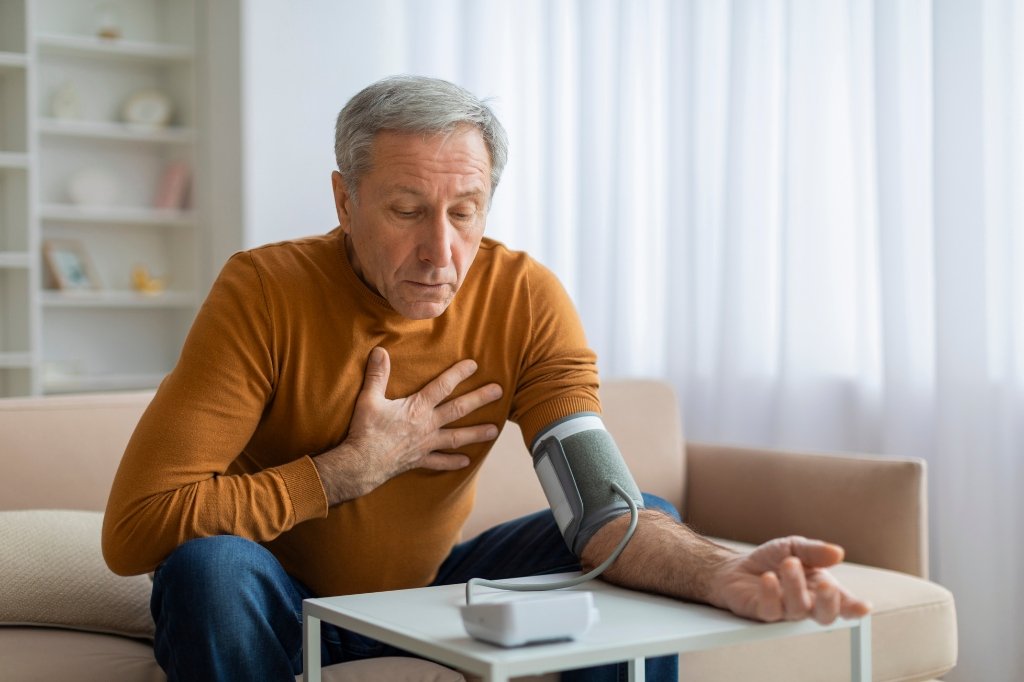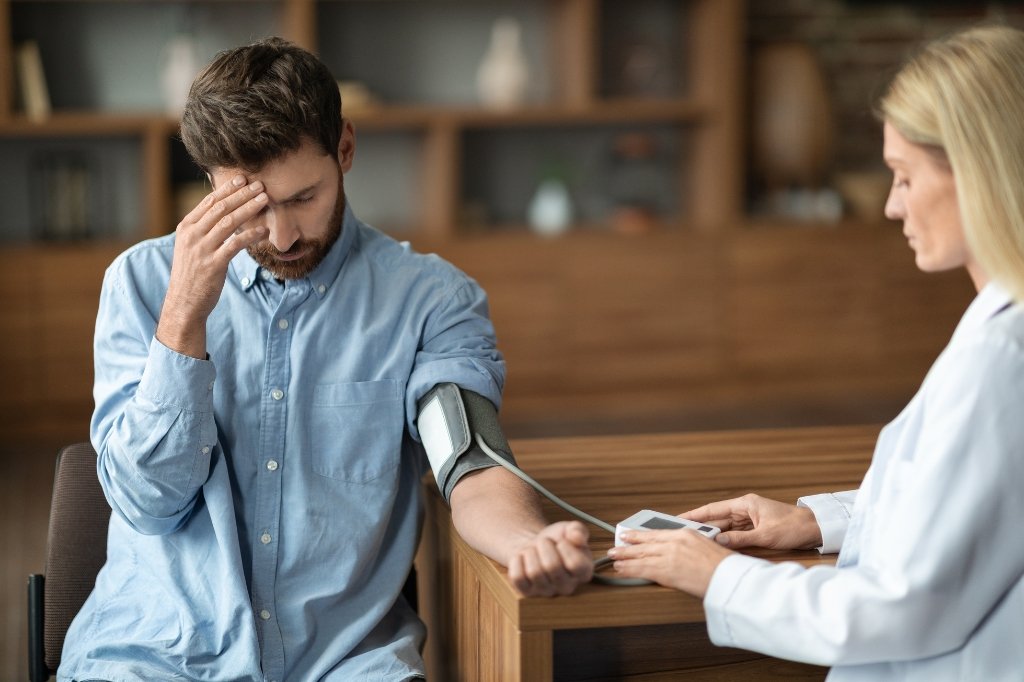Is Your Blood Pressure Too Low? Here’s What You Should Know
When people think about blood pressure problems, high blood pressure usually gets all the attention. But low blood pressure, or hypotension, can also affect your health. For some, it causes no problems at all. For others, it leads to dizziness, fainting, fatigue, and even falls or injury. If you’re wondering whether your blood pressure is too low or if your symptoms could be related, this article breaks it down clearly. You’ll learn the signs of low blood pressure, the hypotension BP range, common causes of hypotension, and when to seek help.
What counts as low blood pressure?
A normal blood pressure level is approximately 120/80 mmHg. Anything under 90/60 mmHg is generally considered low. This doesn’t always mean you have a health issue. Many athletes and healthy young adults have naturally low readings without symptoms. But if your numbers are consistently below 90/60 mmHg and you’re feeling off, your body might not be getting the circulation it needs.
Low blood pressure only becomes a problem if it interferes with your daily life. If you’re experiencing fatigue, light-headedness, or a spaced-out feeling, consider consulting a professional.

What are the common signs and symptoms?
Low blood pressure can have a different experience for each of us. Some people may experience mild symptoms. Others may experience symptoms that hinder their ability to work, exercise, or stand for sustained periods.
Here are the most common signs and symptoms:
- Dizziness or light-headedness
- Fainting or near-fainting episodes
- Blurred or tunnel vision
- Fatigue or unusual tiredness
- Nausea
- Cold, clammy, or pale skin
- Headaches
- Poor concentration or brain fog
- Feeling unsteady when standing up
If you’re dealing with a mix of these symptoms, don’t brush it off. These are clear signs, and they can point to an underlying issue that needs attention.
What causes low blood pressure?
There are many possible low BP reasons. Some are temporary and easy to fix. Others could be related to ongoing health problems or medications.
1. Dehydration
If you’re not drinking enough fluids, your blood volume decreases. This can cause a rapid drop in pressure and dizziness, particularly in the heat or while doing anything active.
2. Nutrient deficiencies
Deficiencies in vitamin B12, iron, or folate may cause anaemia, which decreases the oxygen-carrying capacity of the blood and causes low pressure.
3. Heart conditions
Problems like a slow heart rate (bradycardia), faulty heart valves, or weakened heart muscle can all cause low blood pressure.
4. Endocrine disorders
Thyroid conditions, low blood sugar, and adrenal insufficiency (like Addison’s disease) are all causes of hypotension.
5. Blood loss
Blood volume rapidly decreases once a large amount of blood is lost due to an injury, surgery, or internal haemorrhage. This often causes a dramatic pressure drop.
6. Severe infection
A bloodstream infection (sepsis) can trigger a pressure drop that may become life-threatening without urgent treatment.
7. Medication side effects
Some drugs used for high blood pressure, heart conditions, depression, or anxiety can lower your pressure too much.
8. Nervous system disorders
Conditions like Parkinson’s disease can affect how your body regulates blood pressure.

Different types of low blood pressure
There’s no one-size-fits-all label. Your doctor may try to identify which type of hypotension you have:
- Orthostatic hypotension: A pressure drop when you stand up too quickly. This is common in older adults or people on certain medications.
- Postprandial hypotension: Pressure falls after eating. Often seen in older people.
- Neurally mediated hypotension: Often triggered by emotional stress or standing too long. Seen in children and young adults.
- Shock (severe hypotension): Pressure drops so low that it can’t deliver enough blood to the organs. This is a medical emergency.
Understanding the type is key to figuring out the right solution.
When to see a doctor
If your symptoms are mild and infrequent, you might not need treatment. But regular episodes of dizziness, weakness, or fainting shouldn’t be ignored.
You should seek medical advice if:
- Your symptoms are affecting daily tasks
- You’ve fainted or nearly fainted more than once
- Your readings are consistently in the hypotension BP range
- You’ve recently started a new medication
- You have an existing condition like diabetes, thyroid issues, or heart disease
At Lifeline Clinic Dubai, we take a full-body approach to hypotension. We evaluate your symptoms, trends, lifestyle, medications, and laboratory results to understand the situation.
Diagnosis: What can you expect
The first step has to be accurate blood pressure monitoring. It may be from in-clinic measurements, the 24-hour ambulatory BP monitor, and active standing.
Other tests may include:
- Full blood count
- Electrolyte levels
- Vitamin B12 and iron studies
- ECG and echocardiogram
- Thyroid function tests
- Cortisol levels (to check adrenal function)
We’re not just chasing numbers. We aim to understand how your pressure is affecting your body and your life.

How to manage low blood pressure
Treatment depends on the cause. In some circumstances, minor adjustments might make a significant difference.
- Stay hydrated: This is one of the most straightforward and effective remedies.
- Use more salt: If your doctor says it’s safe, a slightly higher salt intake can raise pressure.
- Eat smaller, more frequent meals to avoid post-meal pressure decreases.
- Avoid long periods of standing, especially in the heat.
- Wear compression stockings: These improve circulation and help push blood back to your heart.
- Rise slowly: Do not jump out of bed or stand up too quickly.
- Limit alcohol: Alcohol lowers blood pressure and can increase symptoms.
- Exercising regularly promotes better circulation and helps maintain low blood pressure naturally.
Final thoughts
Living with low blood pressure doesn’t have to be frustrating. The key is to understand your symptoms, identify the cause, and take action. Some people will feel better after minor adjustments, while others may require more thorough and specific types of care.
If you’re not sure what your symptoms are or would like a more accurate diagnosis, Lifeline Clinic Dubai can help you. We will hold your hand through the entire process, from testing to treatment, with or without your mild symptoms or more serious causes of hypotension. You are not alone!




